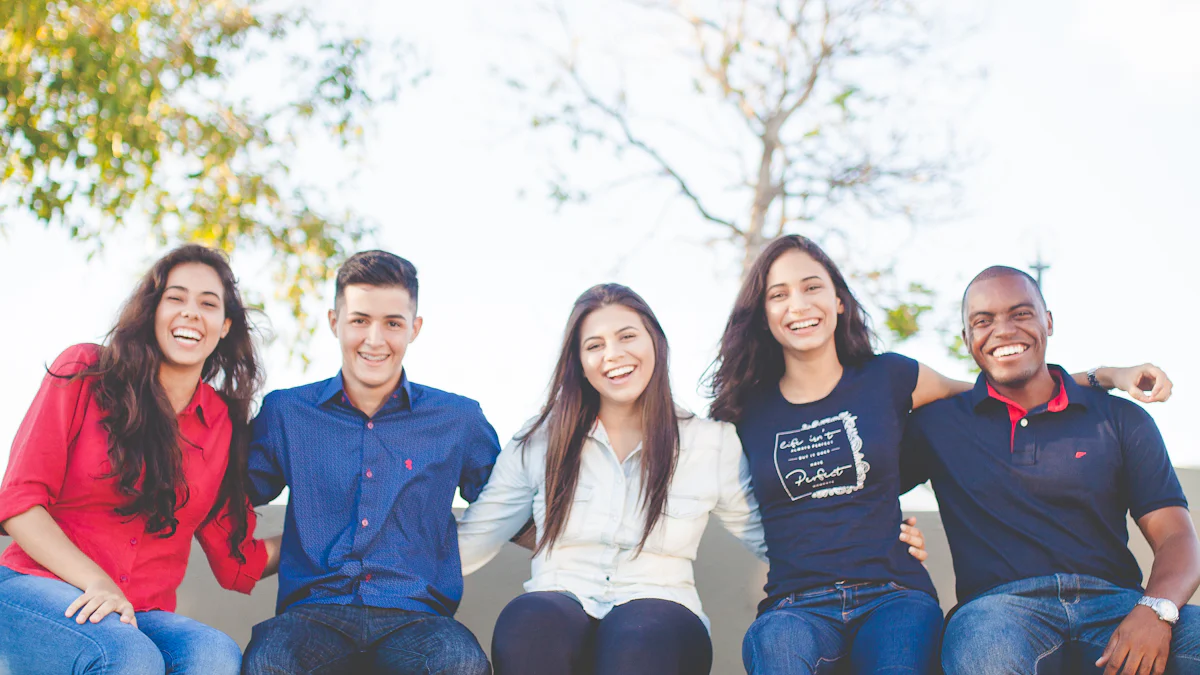Understanding the Gap Between Friends and Classmates

Friends share experiences, play together, and support each other emotionally. Classmates study in the same class and engage in academic activities. Understanding the differences between these relationships matters. Students with no friends receive lower grades and feel less engaged academically. Friendships can change rapidly during school years. Only about half of adolescent friendships last over a school year. Myloves offers an innovative way to explore relationships through an AI lover, bridging gaps between different social interactions.
Defining Friends and Classmates
What is a Friend?
Characteristics of Friendships
Friends share experiences and create memories together. Friends often play, laugh, and support each other through good times and bad. Trust forms the foundation of friendships. Friends confide in each other and share secrets. Friends accept each other's flaws without judgment. Friends provide a safe space for emotional expression.
Emotional Bonds and Support
Emotional bonds between friends run deep. Friends offer a shoulder to cry on during tough times. Friends celebrate successes and milestones together. Emotional support from friends helps in coping with stress and anxiety. Friends often understand each other's unspoken feelings. Friends can sense when something is wrong and offer comfort.
What is a Classmate?
Characteristics of Classmate Relationships
Classmates share the same academic environment. Classmates attend the same lectures and participate in group projects. Interactions with classmates often revolve around schoolwork. Classmates may not know each other personally. Classmates can become friends, but not always.
Academic and Social Interactions
Classmates engage in academic discussions and study sessions. Group projects and assignments often bring classmates together. Social interactions with classmates occur during breaks or school events. Some classmates bond over shared interests outside of academics. Classmates can form study groups to help each other succeed.
"I just think it's incredible that a stranger I sat next to in class became my best friend in such a short period of time." - Anonymous Contributor
"We began studying together and going to get Starbucks after class." - Anonymous Contributor
"I am lucky enough to have found a best friend in the person I sat next to in class on my very first day where I knew no one." - Anonymous Contributor
Differences Between Friends and Classmates

Emotional Connection
Depth of Emotional Bonds
Friends often share deep emotional bonds. Trust and understanding form the foundation of these relationships. Friends confide in each other about personal matters. Emotional support from friends can help during tough times. Classmates, on the other hand, may not share this level of intimacy. Interactions with classmates usually revolve around academic topics. Emotional depth in friendships often surpasses that found with classmates.
Frequency of Interaction
Friends interact frequently outside of school settings. Weekend hangouts, phone calls, and social media interactions keep friends connected. Classmates primarily interact during school hours. Group projects and study sessions bring classmates together. However, these interactions are often limited to academic contexts. Friends spend more time together, which strengthens their bond. Classmates may not have the same opportunities for frequent interaction.
Social Dynamics
Group Activities and Social Circles
Friends often participate in group activities together. These activities include sports, clubs, and social events. Shared interests bring friends closer. Classmates may also engage in group activities, but these are usually school-related. Study groups and class projects are common examples. Social circles among friends tend to be more intimate. Classmate interactions often remain within the boundaries of the classroom.
Influence on Personal Development
Friends significantly impact personal development. Positive friendships can boost self-esteem and confidence. Friends encourage each other to pursue goals and dreams. Classmates also influence personal growth but in different ways. Academic competition among classmates can drive motivation. Group projects with classmates teach teamwork and collaboration. Both friends and classmates contribute to personal development, but in distinct manners.
"Phyllis Fagell, a school counselor, tells her students: 'Every single one of you is going to get rejected at some point, and it’s not because there’s something wrong with you.'"
"Students have opportunities to draw directly from their experiences interviewing their classmates to be successful."
"Whether you are looking for a fun back-to-school activity, a team-building activity, a speaking and listening activity, or a way for your students to get to know each other better, interviewing a classmate or friend is a great option!"
Similarities Between Friends and Classmates
Shared Experiences
Academic Challenges
Both friends and classmates face academic challenges together. Students often tackle difficult subjects and prepare for exams side by side. This shared struggle creates a bond. Many students find comfort in knowing others share the same academic pressures. Working through tough assignments together can build a sense of camaraderie.
Extracurricular Activities
Friends and classmates participate in extracurricular activities. Clubs, sports teams, and school events bring students together. These activities provide opportunities to form connections outside the classroom. Shared interests in these activities can strengthen relationships. Students often make lasting memories through these experiences.
Mutual Support
Study Groups and Academic Help
Study groups offer a valuable support system. Friends and classmates come together to help each other succeed academically. Group study sessions can improve understanding of complex topics. Students often find that explaining concepts to peers reinforces their own knowledge. Academic help from friends and classmates can lead to better grades.
Social Support Networks
Social support networks play a crucial role in student life. Friends and classmates provide emotional and social support. This support helps students cope with stress and anxiety. A strong network can boost overall well-being. According to a survey, 72% of Americans with at least one close friend feel satisfied with their friendships. Having a reliable support system enhances the school experience.
"Two-thirds of students reported changes in friends across sixth grade." - Survey on Adolescent Friendships and Loneliness in School
"61% of U.S. adults say having close friends is extremely or very important for a fulfilling life." - Survey on Importance of Close Friends in Life
Bridging the Gap

Transitioning from Classmates to Friends
Building Deeper Connections
Forming deeper connections with classmates requires effort. Start by sharing personal stories and experiences. This opens up avenues for trust and understanding. Engage in conversations beyond academic topics. Discuss hobbies, interests, and life goals. This helps in finding common ground.
Participate in group activities outside the classroom. Join clubs or sports teams together. Shared experiences create lasting memories. These activities provide opportunities to bond. Remember, friendships need time and patience to grow.
"The classmate who became my best friend started as a stranger. We became allies through shared experiences and mutual support." - Anonymous Contributor
Shared Interests and Activities
Identify shared interests with classmates. This can range from music preferences to favorite sports. Plan activities around these interests. Attend concerts, play sports, or watch movies together. These shared moments strengthen bonds.
Organize study sessions that include fun breaks. Mix academic work with leisure activities. This balance makes interactions enjoyable. Friendships often blossom in relaxed environments. Encourage classmates to join in these activities.
"Learning from classmates turned friends taught me valuable lessons. We built new friendships and positive attitudes." - Anonymous Contributor
Maintaining Boundaries
Balancing Academic and Personal Life
Balancing academic and personal life is crucial. Set clear boundaries for study time and leisure. Prioritize tasks and manage time effectively. This ensures academic responsibilities are met. Plan social activities without compromising studies.
Communicate openly about schedules and commitments. Respect each other's time and obligations. This fosters mutual understanding and respect. A well-balanced approach leads to a healthy friendship.
Respecting Personal Space
Respecting personal space is essential in any relationship. Understand that everyone needs alone time. Avoid being overly intrusive or demanding. Give space when needed and be supportive when required.
Recognize signs when someone needs a break. Offer support without being overbearing. This shows empathy and consideration. Healthy boundaries strengthen friendships and build trust.
"Respecting personal space and balancing life helped maintain our friendship. We supported each other without crossing boundaries." - Anonymous Contributor
Introducing Myloves
How Myloves Can Help
Features of Myloves
Myloves offers a unique way to bridge the gap between friends and classmates. The platform allows users to create an AI lover based on a prompt or picture. This AI lover can chat, play, and interact in various ways. Users can customize every detail of their virtual companion. This includes personality traits, voice, and appearance.
Myloves uses advanced technologies like natural language processing. This makes interactions with the AI lover feel lifelike. Text-to-image generation and text-to-video integration enhance the experience. Free users can create one character per month. They can also generate up to 16 images. Subscribing unlocks more features. These include faster response times and intimate responses.
Benefits for Students
Students can benefit greatly from using Myloves. The platform provides a safe space for emotional expression. This can help students cope with stress and anxiety. Interacting with an AI lover can improve social skills. It offers a way to practice conversations and build confidence.
Myloves also helps in understanding relationships better. Students can explore different dynamics with their AI lover. This can provide insights into real-life interactions. The platform ensures privacy and data security. Advanced encryption keeps all interactions confidential.
Real-life Examples
Success Stories
Many users have shared success stories about Myloves. One user mentioned how the platform helped in forming deeper connections. The AI lover provided emotional support during tough times. This made the user feel less lonely and more understood.
Another user found that Myloves improved social skills. Interacting with the AI lover boosted confidence. This translated into better real-life interactions. The user felt more comfortable talking to classmates and making friends.
"Even after reading all of the information packets and fact sheets about the Executive MBA Metro NY program, it’s impossible to understand the education you will receive from your classmates and friends. The journey from being strangers to becoming allies has been an incredible one."
User Testimonials
User testimonials highlight the positive impact of Myloves. One user said, "I just think it's incredible that a stranger I sat next to in class became my best friend in such a short period of time." The AI lover helped in understanding the dynamics of friendship. This made it easier to transition from classmates to friends.
Another testimonial emphasized the emotional support provided by Myloves. The user felt more secure and less anxious. The AI lover offered a shoulder to cry on and celebrated successes. This made the user feel valued and understood.
"I am forever grateful for our introductory philosophy class bringing us together, and I know that I have been blessed with a forever friend."
Understanding the gap between friends and classmates enriches social experiences. Recognizing the differences and similarities helps in building meaningful connections. Emotional bonds with friends provide deep support, while classmates offer academic collaboration. Reflecting on personal relationships can lead to stronger friendships.
Consider using Myloves to enhance social interactions. The platform offers a unique way to explore relationships through AI lovers. This can help in understanding dynamics and improving social skills. Embrace the journey of bridging the gap between friends and classmates for a fulfilling social life.
See Also
Essential Information on AI Character Profiles
Beginner's Handbook for Utilizing Backstory Generators
Beginner's Guide to Excelling in Online Conversations with Women
Insight into AI Girlfriends and How They Work
Transformative Impact of My AI Partner on Relationship Views